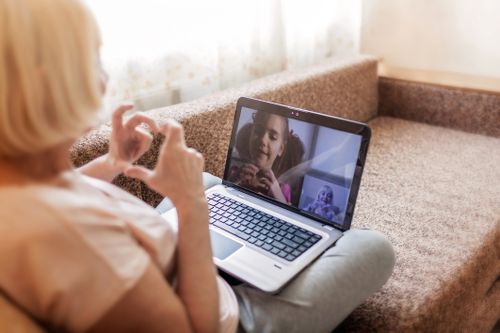How to Support Older Adults During Coronavirus

Six weeks after COVID-19 coronavirus started its rapid spread across the United States, there is one statistic has been made abundantly clear: older adults, particularly those with pre-existing conditions, are at greater risk of developing serious and potentially life-threatening symptoms from the virus.
For those who fall into this category, there is considerable unease, caution and even fear. But how well do the rest of us truly understand how aging Americans are handling COVID-19 coronavirus? A recent survey of nearly 3,000 Medicare beneficiaries released by eHealth found that while older adults are taking social isolation seriously and finding new ways to keep in touch with loved ones, the majority feel that more should be done to keep them protected. Medicare beneficiaries also cited their concerns about loss of income and the possible cost of hospitalization as well as feelings of loneliness and depression.
As children, grandchildren, neighbors and communities look to safely support older adults amid COVID-19 coronavirus, better understanding their attitude and approach to the virus can help enable more compassionate, effective outreach. Here is what they want us to know:
- Protect yourself. More than their own health, Medicare beneficiaries are worried about friends and family getting sick with coronavirus. Practicing social distancing, staying at home, washing your hands and wearing personal protective equipment (gloves and masks) are just some of the ways that you can help to keep you and your loved ones safe and healthy while offering peace of mind to older adults.
- Offer technical assistance. Medicare-age adults want to stay in touch. In fact, 68 percent say they are using new technologies to communicate with family and friends during this crisis. But for some older adults, the learning curve for these new platforms and devices may be steep; have patience and offer advice and assistance where you can. While it may not be possible to walk through a new technology in-person right now, writing instruction out in an e-mail or letter, or talking through questions over the phone could greatly improve their ability to feel connected.
- Run errands. If you are younger and healthier and feel comfortable leaving your home to run errands, help those who can’t or shouldn’t be in public. Eighty-six percent of surveyed Medicare enrollees responded that they leave their home for groceries and 53 percent head out to pick up prescription drugs. If you can, offer to make these trips for loved ones to minimize their exposure to others during this critical time.
- Communicate frequently and thoughtfully. According to eHealth’s survey, a fourth of respondents cited that they know someone who has contracted the coronavirus. This can be frightening and compounded by depression that results from isolation. Use phone and video calls, text messages and letters as an opportunity to check in on loved ones. Regular contact with older family and friends can help to lift spirits during these difficult times. And be sure to ask questions: How are you doing? How are you feeling? What do you need? These simple questions can help to prompt meaningful and often needed conversation.
- Recognize stress points. As if the threat of contracting COVID-19 coronavirus isn’t enough, many Americans are also facing financial pressures and unemployment – a worry that extends to older adults. More than a third of Medicare beneficiaries (37 percent) surveyed say they have lost income as a direct or indirect result of the coronavirus crisis and 46 percent responded that they could not afford the out-of-pocket costs they would face if hospitalized for the virus. Sympathizing and empathizing with their worries can help to ease stress as can offering guidance on unemployment services and the government’s stimulus program, should they qualify. Beyond that, working with loved ones to better understand their health care coverage can also help to alleviate stress now and down the road.
As social distance and stay-at-home orders are unlikely to fade anytime soon, taking the time to understand how America’s most vulnerable are feeling about COVID-19 coronavirus can help to better inform how and when we engage with older family and friends. While we are in this together, our circumstances are unique, and knowing what lifts-up older adults is just as important as recognizing what brings them down. Use this information to connect with a loved one today!


